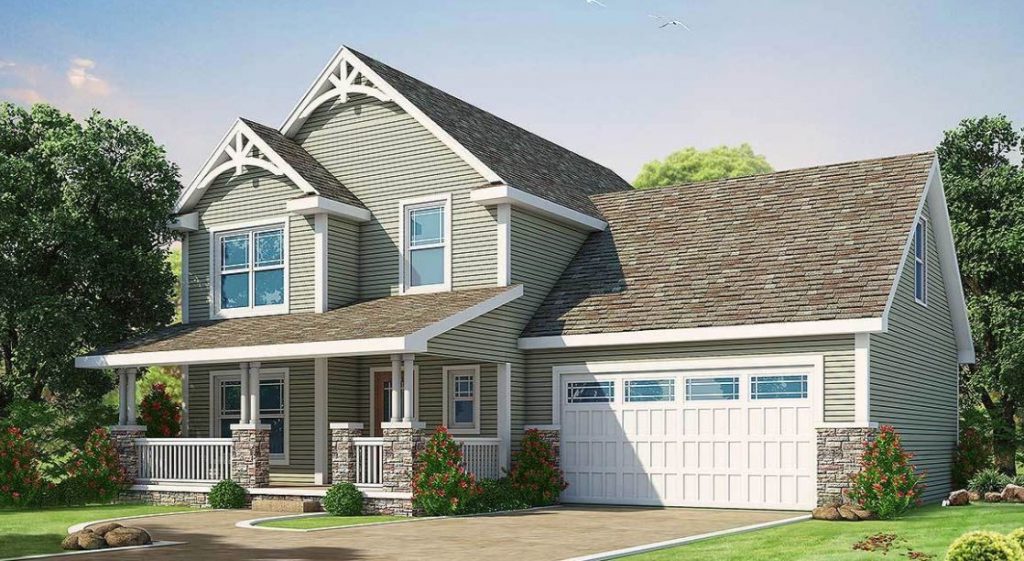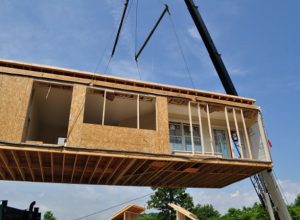Moving from Misconception to Clarity: Understanding Modular Construction


Have you ever watched a baby as it learns to walk? As a parent you watch your child try to take its first steps and fall. They try again and fall. You worry they will hit a wall, land too hard on the floor, or hit their head on a piece of furniture. They don’t have those same worries. Their reactions are based on their physical drive to walk, on making a bold step forward. A parent’s fear is taught by external forces. The parents dwell in a fear that the child cannot fathom. The child learns and adjusts as she masters her new mode of locomotion. In the construction industry, building systems have become the new way forward. There is a new generation of savvy builders and home buyers that are learning how new building methods make better, healthier, and more energy efficient homes. They are unimpeded by the past, unafraid of modern building methods. However, there is still the fear of something new that has been instilled in past generations that holds back better building methods.
Getting Past the Past
Modular construction is a method that has evolved and grown over the years. The method itself, just like any other construction technique is being constantly improved. Factories are using new structural materials that allow for larger open spans. Home designers are able to create just about any home plan or design using modular construction. A modular home has evolved from its infancy and now leads in the residential construction industry in creativity, energy efficiency, design, and value while providing some of the healthiest living spaces.
One of the biggest impediments is the misconception or misunderstanding of what modular construction is. This is primarily driven because of modular constructions affordable housing cousin, the mobile home (manufactured home). Everything starts with an “M” and sounds the same. While modular and manufactured homes both take advantage of the efficiencies of factory construction, they do it for very different purposes. Manufactured homes are targeted to affordability. They are built to a building code that is very different from the building code that both modular homes and homes constructed onsite are required to follow.
 Modular homes are built to the same building code as a home built onsite. The term modular home is actually a misnomer. Modular is a method of construction, not a type of home. Builders for years have been using modular components in homes built onsite. Roof trusses and floor trusses are two common ones. Modular construction just delivers a modular section as a larger, more complete component in an overall home build.
Modular homes are built to the same building code as a home built onsite. The term modular home is actually a misnomer. Modular is a method of construction, not a type of home. Builders for years have been using modular components in homes built onsite. Roof trusses and floor trusses are two common ones. Modular construction just delivers a modular section as a larger, more complete component in an overall home build.
Moving Through the Fear
Many builders and homeowners only know their perception in the past of what modular homes are or aren’t. Modular construction is a building method. It is a very different building method than building onsite. It requires different processes, different staffing, and a different skill set than traditional builders know. It’s human nature to resist change. For many, change is painful. However, in today’s world of construction, change is imperative.
RELATED: THERE IS MORE TO WINDOWS THAN MEETS THE EYE
There is a growing labor shortage in the United States. Builders that don’t embrace new ways of a building will be forced to staff skilled positions with unskilled labor. Attracting employees will require higher pay, requiring home prices to rise. This is a terrible combination of paying more and getting less. The custom home buyer becomes the loser in this proposition.
 Modular construction is a method that concentrates the construction of many homes in one place. It turns home construction into a manufacturing process. It helps train labor than can work indoors year round and produce homes cost efficiently and with the quality only found in a manufacturing process. A process much like one that is used to build your car, your phone, or your computer. If homeowners and custom home builders can get past the fear of something new, they can take the next bold step towards something that is actually better than the current method they have become so comfortable with.
Modular construction is a method that concentrates the construction of many homes in one place. It turns home construction into a manufacturing process. It helps train labor than can work indoors year round and produce homes cost efficiently and with the quality only found in a manufacturing process. A process much like one that is used to build your car, your phone, or your computer. If homeowners and custom home builders can get past the fear of something new, they can take the next bold step towards something that is actually better than the current method they have become so comfortable with.
Taking the Next step
When it comes to building a custom home, home buyers have the internet. The internet is a great research tool to find out what today’s leading edge architects, builders, and modular home factories are doing with modular construction. Research home designs that can be built with modular construction. There is practically no limit on what type of home can built. Learn how building in a factory to tighter tolerances and with higher quality control than can ever be achieved in field construction makes new homes more energy efficient. A home that has never been rained on eliminates the breeding ground for mold and doesn’t leave moisture in the walls to create mildew odor just has to be healthier.
Builders should be looking at modular construction as the next step in their evolutionary process of building better homes for their customers. Thirty years ago many builders would have never used those 2”x4” engineered trusses in their homes roofs. Now there is barely a builder today that doesn’t use them. Why? Because they are better quality, stronger, built offsite, and then installed faster onsite helping to speed up the current building process with a strong roof. By assembling more of the components offsite and delivering onsite, modular construction takes that same concept to a whole new level. Modular isn’t a competing building system, it is simply the next step in the evolutionary process of building custom homes.
Modular Makes it Better
Whether you are a home owner building a new custom home or a home builder frustrated with trying to provide a quality custom home to your customer in today’s construction environment, modular construction offers an alternative. It provides an option today that offers flexible design, provides great value, and deliver a consistent level of quality. It just does it in a different way than using conventional, outdoor construction. Modular offers a change for the better.
The post Moving from Misconception to Clarity: Understanding Modular Construction appeared first on Impresa Modular.




